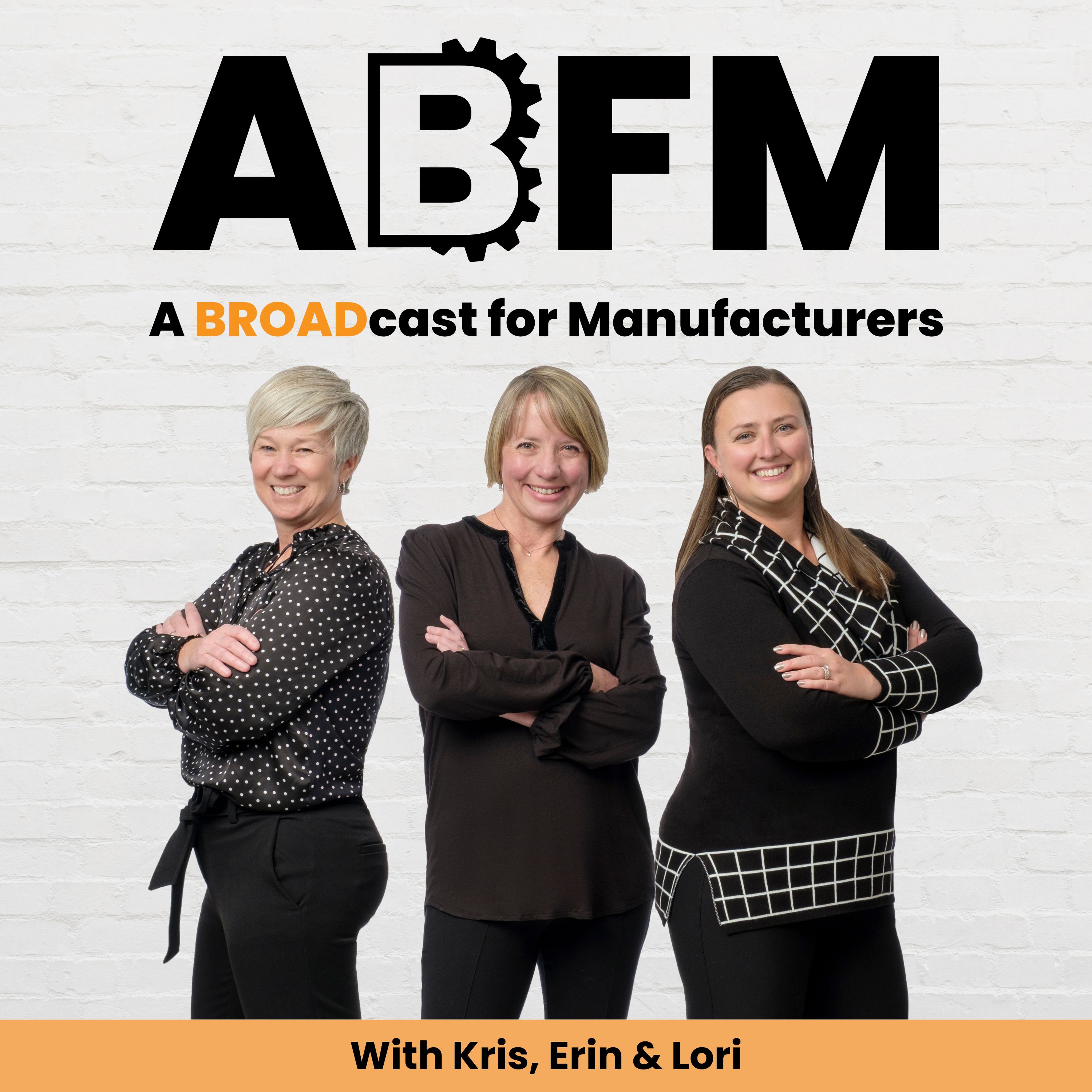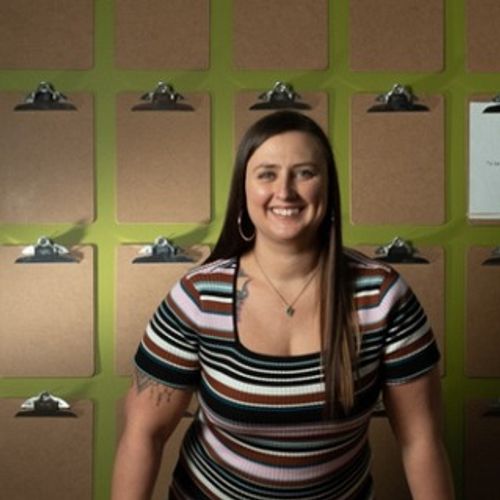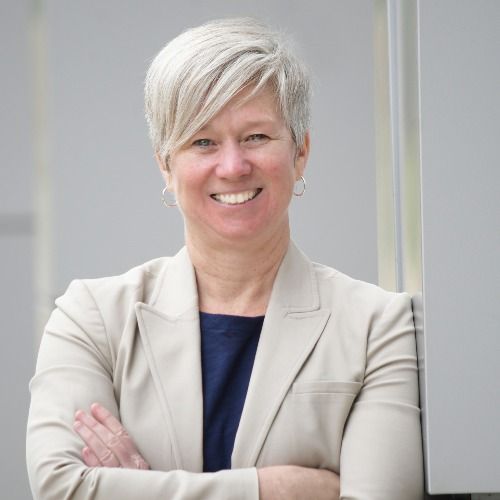Episode 11
11: Robotics in Manufacturing - with Daniel Rogge
Meet Daniel:
Daniel Rogge is the CEO of Tormach and has a diverse background that includes experience as a professional metal fabricator, educator, Motion Control Engineer, and software developer. He holds a BA from Grinnell College, and an MS in industrial engineering, with the focus on manufacturing from University of Iowa. He continues to focus professionally on what he spent his time doing as a teaching assistant at Iowa, helping people make things!
Erin: Can you explain what is done over at Tormach?
Daniel: We design, sell, and support tools that help people make stuff, largely smaller computer controlled tools. So, milling machines, lathes, plasma cutters, CNC routers, more recently, automation products, like industrial robots, but the general idea is, these are all tools that especially when the business started 20 years ago, were incredibly hard to get your hands on. So we make that stuff available to everybody. We have a very wide range of customers.
Kris: Do you know what your customers are going to do with a machine before they purchase it? Is that something they're often sharing with your sales team or to discover which machine they need?
Daniel: We don't have a sales team. More and more people do their research online and buy stuff without even talking to people. We have like tech support staff that are machinists and engineers and we do have two people that do like kind of up resale advising a lot of folks, they know that a milling machine could be used to make their part, but they don't quite know how and they want to ask questions. We don't call people or, you know, take names that trade shows and then call to follow up or anything like that. It's very much customers come to the website. And if they call us up, we ended up talking to them. I don't, um, it kind of varies by industry. Okay, whether we know what they're making, some folks are really vocal about it, and some folks not so much. And it also kind of varies by product, like the robot is a pretty new product. And so we definitely ask a lot of questions before somebody buys a robot because some people think you can do just about anything with a robot, which turns out is not true.
Lori: What do you think is going to be critical and vital for the next 10, 20, 30 years for American manufacturing to really excel and flourish here?
Daniel: We could come up with a national health plan or socialized medicine. I talked about that person that didn't have to quit his day job in order to become basically a cottage industry. He was he's manufacturing products in his garage and he didn't have to quit his day job. And the reason that was important to him is he has healthcare through his day job, as I'm sure perhaps the other people on this call have either healthcare through their jobs or their spouse's job. That's a huge burden to people starting small businesses, to people starting small manufacturing businesses. There's a lot of there's a lot of demand for manufacturing here, more demand than there is capacity. And there are plenty of small folks that would be happy to go out on their own. I mean, the big market that we sell to, but it's it's tough doing without decent health care, A and then B, over the next 10 to 15 years of health care costs continue to go at the pace that they have, I mean, they're outpacing even today's crazy inflation and health care costs are up with so clearly the country has to do something about that. But I actually think that would be helpful for manufacturing the United States.
And so much more…
Connect with Daniel
Connect with the broads!
Connect with Erin on LinkedIn and visit http://www.earthlinginteractive.com for web-based solutions to your complex business problems!
Connect with Lori on LinkedIn and visit www.keystoneclick.com for your strategic digital marketing needs!
Connect with Kris on LinkedIn and visit www.genalpha.com for OEM and aftermarket digital solutions!
Transcript
Lori Highby Chris Harrington and Aaron Courtney, three broads, bringing you stories and strategies exploring manufacturing topics that
Lori Highby:Right so right now we're talking about songs. Is that what we're talking about beforehand?
Erin:Yeah, actually, our intro song made me think of it like, you know, music and music that really kind of gets you going. And I was wondering
Lori Highby:I can start. Yeah,
Kris:I actually do love music. But I always forget the names of songs. So I am a person that I will actually take breaks during the day, get in the
Erin:I love it. Okay, awesome. Worried? Yeah,
Lori Highby:so not necessarily. There's too many songs to pick one. I'm just gonna do that. But what I will tell you is that I my most played
Erin:know, complaints I put out. Yeah, music you can drink to like it. Hipster cocktail party. Awesome. I've had on just replay lately, this song
Erin:time with us today because we have Daniel rogie on the show. He's the CEO of torma Welcome Daniel Rogge. We're gonna call you rogie today.
Unknown:That sounds perfect for having me.
Erin:So, so Rogge you're the CEO of tormach. And you have a diverse background that includes experience as a professional metal fabricator,
Erin:awesome. Welcome so much today.
Unknown:Well, thanks for having me. Helping people make stuff is a lot of fun, as it turns out.
Erin:Before I get started with questions, if there is anybody in our audience that just isn't quite familiar with Tormach. Can you just give us
Unknown:We design, sell, and support tools that help people make stuff, largely smaller computer controlled tools. So, milling machines, lathes,
Unknown:were really hard to use the tools that were available, you know, the user interfaces are pretty abysmal, and they were super expensive. And, and so,
Unknown:smaller, but still able to make things out of metal much easier to use much more affordable. Work on single phase power, the kind of household power
Erin:Well, I just love that. I think I you know, I think back to my shop class in high school, and just how much I loved it. And I didn't pursue it,
Erin:story of one of your customers is just like lights you up? Someone who's just making cool shit?
Unknown:Can I tell a couple? I'll
Erin:yeah.
Unknown:We have customers that do all sorts of wild stuff with our equipment. Like when you think of a CNC mill, you think, Oh, well, it's
Unknown:equipment that isn't even machining. So NASA uses one of our milling machines with a fourth access to wind, antenna coils. There's just endless.
Unknown:to the hotel, and there's a pool, and there's a wheelchair lift that helps people get out of the water pressure like those. That's a business. Those
Unknown:and he had one of our lathes. And he had automated it. So it was kind of running for two hours at a time by itself making a piece cutting it off and
Unknown:these pieces made. And so I'm kind of double dipping, because I'm able to work eight hours a day at work from my garage, and every two hours take a
Erin:Yeah, yeah.
Lori Highby:Pursue
Unknown:one of their passions or one of their dreams without having to quit the day job or take that giant leap.
Erin:Yeah,
Kris:I'm curious how often we're all good. Do you know what your customers are going to do with a machine before they purchase it? Is that something
Unknown:We don't have a sales team. More and more people do their research online and buy stuff without even talking to people. We have like tech
Unknown:It's very much customers come to the website. And if they call us up, we ended up talking to them. I don't, um, it kind of varies by industry. Okay,
Lori Highby:Oh, no. Yeah, not. Yeah.
Unknown:And then also, we, you know, we have a little web form when people are looking to purchase we ask them what they're interested in and what
Lori Highby:well, that just keeps playing in my head. I keep thinking Austin Powers right now, I'm sure all of you are thinking, just keep the
Lori Highby:around that diverse workforce, there's conversation around automation leading the way. And even policy being the linchpin for really securing US
Unknown:Oh, how much? How much time do we have?
Erin:To take all the time you need?
Unknown:First off? I don't know. Like, if I get that right on the table, I'll give you my opinion. But it's completely, you know, the pandemic has
Unknown:ton of people either reshoring or nearshoring. During the pandemic. And I think part of that is, is the, you know, continued stuff that was set in
Unknown:shipping costs, the increase in time, the transit time with port congestion, China's COVID lockdown policies, you know, a lot of people have
Erin:Yeah, you're
Unknown:gonna be a sound like a strange answer. Right.
Erin:Let's have it. Yeah. stream channel Chancers.
Unknown:We could come up with a national health plan or socialized medicine.
Erin:Tell us more. Yeah.
Lori Highby:Definitely leaning into this
Unknown:I talked about that person that didn't have to quit his day job in order to become basically a cottage industry. He was he's manufacturing
Unknown:businesses. There's a lot of there's a lot of demand for manufacturing here, more demand than there is capacity. And there are plenty of small
Unknown:do something about that. But I actually think that would be helpful for manufacturing the United States.
Lori Highby:I love that answer, actually, and I don't want to go into a big conversation around this, but I've never understood why health care is
Unknown:A lot of it went back to the labor shortage after World War Two and companies competing on that. But that's a different,
Lori Highby:totally different topic. Totally different podcasts.
Unknown:The other thing that the other saw, and I I hinted at this, I think we're I hope, in fact, one of the things Tormach wants to do is bring
Unknown:20 years, that became less certain and so we want to bring stuff back to the United States. But you remember when the pandemic in lockdowns
Unknown:variants have generally been less than I imagined on Omicron variant with the severity of the Delta variant. And that could we could see things go
Erin:Oh, that's a mixed. That's a lot.
Erin:That's a lot to process. But I think the the takeaway, I love what you said at the end at the beginning of your answer what no one can predict the
Erin:adaptability, and you know, guaranteed health care as part of that, just that you have the ability to respond to the circumstances, that's what
Erin:And let's take care of each other. So
Kris:I definitely say preach Rogi preach. We need more entrepreneurs, entrepreneurs, help this country grow. I'm sure not just this country, but
Kris:know, right to repair is something that has been a bit controversial over the years and the b2b companies that you know, certainly I am in touch with
Unknown:Well, we're, we're big fans of the right to repair, which means different things to different people, right? I mean, I will confess that
Unknown:we, we don't design our own contactors, we just go by contactors. And if that contactor is not available on a 20, amp, double pole, you know,
Unknown:replacing resistors, or Opto, isolators, or relays on boards that have gone bad over the years, which surprises me, because in my world, that's not
Unknown:other industrial equipment, it drives them nuts, I mean, you spend $150,000 on a machine, and then you're told that you can't bring in the company, you
Kris:Yeah, I definitely like to say that technical data is currency today. And I do think that when people shop for capital equipment or large assets
Kris:They're They're creative, they have ideas about something that they want to build in and put out into the world. And they may have the interest in even
Unknown:some of them, some of them. Yeah, for sure. You know, another thing that I think goes when you think of right to repair, you do think of
Unknown:with an update, whether you'd want it or not, you're just kind of forced to take it which you might get driven nuts by word getting updated. And then
Unknown:something. Or maybe you got to really advance you know, I think Tesla perhaps is able to do a network network firmware update. But in our world,
Unknown:try to move that way too, because software is increasingly a really important part of industrial equipment.
Kris:Yeah, love that.
Erin:Well, the this has been super interesting. And I am going to confess I, I learned a term when I was doing my research for this podcast. And I
Unknown:The democratization of manufacturing. To me, it just means making things available to not just deep pocketed corporations, but to individuals
Unknown:CNC machines, and you can make those available to people that are able to fund a modest Kickstarter project, or are able to afford a couple $100 A
Unknown:bring manufacturing back. And I don't mean like the really fancy automation, when you see like the robot doing assembly and it's got a
Unknown:assembly plant with these crazy robots coming in to spot weld the car frame, right. But if you go to any of the small businesses in the little
Unknown:quality control is worse than robotic welding. And if we can get robotic welding to a place where you don't need a two year degree in Industrial
Unknown:in this country right now. And for some welding tests, it's not a fun job, right. And so if we can make this make a product that's easy enough to
Unknown:the reaction that we got on automated anything.
Erin:Yeah, well, I love that idea of democratization of manufacturing, both for the individual level to give freedom to the individual to
Erin:so Oh rogie this time we wrap up. All round we do round robin, and you've complete the sentence. I just learned that. So let's start with Laurie, and
Lori Highby:Yeah, so I'm really like, I don't know what the word is your brains not working tape. But anyways, I'm like, I'm digital. Like, that's
Lori Highby:and marketers say, this is where I need to be you. Well, the United States Post Office actually conducted some research and found that millennials
Lori Highby:whole Old School, snail mail still is an active way to get in front of your audience. So I thought that was fascinating.
Kris:It is fascinating. I always think that I love getting a letter in the mail. You know, I personally, am a Gen X. So when I get ads, it's just rip
Lori Highby:Absolutely. I'll include the link to their findings in the show notes, too. Yeah, please do.
Erin:Perfect. Thank you. Chris, what about you? Yeah, so
Kris:I just learned a new quote that I that really resonated with me and my morning reading, so I'm going to read it. Mistakes are a fact of life.
Kris:with this quote, she's an American poet, born in 1943. Her most famous poem is Nikki Rosa, I haven't had a chance to look at the poem yet. But again,
Unknown:very true, not just personally, but for business relationships, you know, I mean, we saw a number of machines, and they're complicated
Erin:right? Response. Exactly.
Lori Highby:As soon as you said that this popped in my head, I had a hockey coach, I would always say, fix your mistake. And then just like i
Erin:Right, right. There's an assumption there that a mistake will happen, which is almost more helpful than like, if you make mistakes.
Lori Highby:Perfect. We're not perfect. Yeah, that's good.
Erin:That's a good one. Yeah. And what about you? Um, well, I see. As per usual, I'm a little off in the deep end here. But I just learned Quakers.
Erin:and just continue their worship by being deeply respectful to other people. And I just think I thought that was really interesting to learn about their
Unknown:Are you all familiar with FIRST Robotics? high school level? Oh, no. You'll have to have to google that.
Erin:Right. Okay. First Robotics. It's a robotics challenge
Unknown:for for high school level students. And in general, they, they find out what the challenge is in January, and then they have six weeks to
Unknown:minutes. And if you look at the YouTube video, okay, pretty amazing if you just YouTube FIRST Robotics Frisbee. These high school kids built those
Erin:That's awesome. Is that a national competition
Unknown:or is that a national competition? Yeah, yeah. Okay.
Erin:Okay, so all the schools can participate. Cool. I can't wait to check that out things. Awesome, everybody. Well, just a pleasure to chat with
Erin:all.
Kris:Thank you so much. Thank you. Yeah. See.
Unknown:This wraps up today's broadcast. If you're looking to shake up the status quo at your organization, or just want to connect with these broads.




